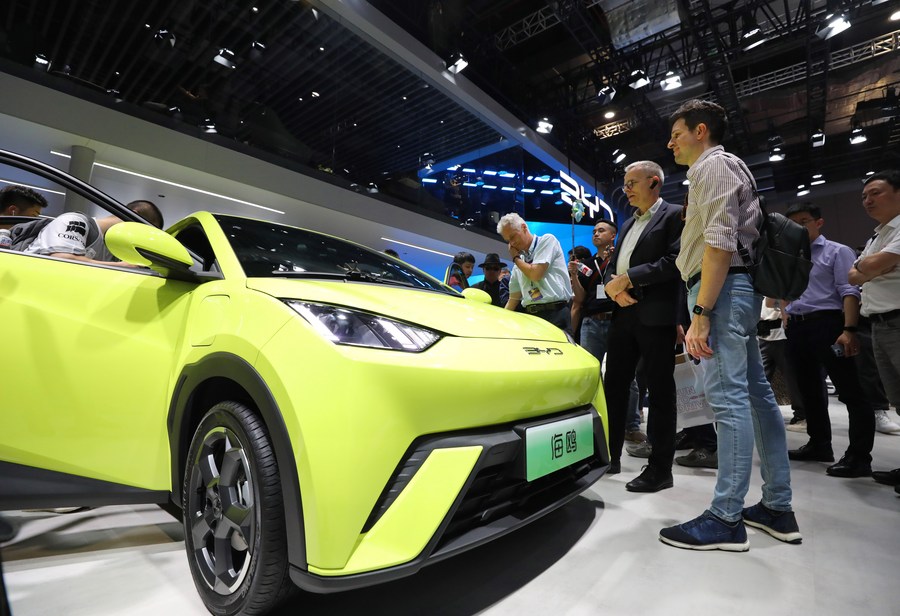Commentary: Why "China collapse" fearmongering destined to fail again

A BYD Seagull is displayed at the 20th Shanghai International Automobile Industry Exhibition in Shanghai, east China, April 18, 2023. (Xinhua/Fang Zhe)
Hyping up China's "collapse" won't disrupt China's economic development. In the era of globalization, all countries should work together and learn to coexist for a better future.
BEIJING, Sept. 19 (Xinhua) -- Some Western officials and media outlets have recently signaled doom and gloom for China's economy with biased reports that paint it as on the verge of "collapse."
The intent is to mislead the world, shake confidence in China's economy and undermine China's cooperative relations with other countries.
Here's a sense of some of the many downbeat headlines: "Peak China?" printed The Economist in bold letters on its May 13 cover; "China's economic collapse carries a warning about our own future," read the headline of an article of The Hill; "China's unprecedented economic crisis worries the rest of the world," Le Monde reported.
Throughout China's rise over the past four decades, there has never been a lack of doomsayers uttering dire warnings about the country's economic outlook. Yet their pessimistic forecasts have never accorded with reality.
Take American writer Gordon Chang's infamous "China collapse" theory. In his 2001 book The Coming Collapse of China, he predicted that the Chinese economy would collapse by 2011, which was proven wrong. He changed the timing of his prediction multiple times and was proven wrong every time, becoming a laughingstock.
"All sorts of comments predicting the collapse of China's economy keep resurfacing every now and then. But China's economy has outlived them all. What has collapsed is such rhetoric, not China's economy," Chinese Foreign Ministry Spokesperson Mao Ning said at a regular press conference last week.
Despite a sluggish economic recovery globally, the Chinese economy has shown strong resilience and great potential, remaining a major driving force for global growth.

Guests visit the 23rd China International Fair for Investment and Trade (CIFIT) in Xiamen, southeast China's Fujian Province, Sept. 8, 2023. (Xinhua/Lin Shanchuan)
In the first half of the year, China's GDP expanded by 5.5 percent, the fastest among major economies. The International Monetary Fund in July estimated China's 2023 growth rate at 5.2 percent, while global growth is projected to be 3.0 percent, with the United States at 1.8 percent.
Yet some Western observers remain "selectively blind" to serve their ulterior motives.
"Today's doom-mongering about China says more about the Western elite's sense of confusion, inertia and impotence than about anything really happening in China," said British online magazine Spiked in a recent article titled "The fall of China? Don't bet on it."
"A Western elite that has lost its sense of purpose and confidence might take some solace from the imminent collapse of its biggest geopolitical adversary," it added.
Smearing China's economy won't solve their own problems. As evidenced by Fitch Ratings' recent downgrading of the U.S. debt rating from AAA to AA+, the country's economic trajectory is far from stellar.
A "ticking time bomb" is how U.S. President Joe Biden recently described the Chinese economy. "Yet, should the notion of a 'ticking time bomb' indeed resonate as a motive, it finds its ironic resonance more aptly in the realm of U.S. economic affairs," The Jakarta Post said.
Such a "Chicken Little" tactic, which aims to instill fear in the audience and sway public opinion, has become "a staple in the playbook of electioneering" when U.S. politicians try to attract public attention by vilifying China, the newspaper said.
Besides fearmongering, some Western politicians tried to drive a wedge between China and its neighbors by floating the idea that such economic "collapse" may have a spillover effect.

This aerial photo taken on July 11, 2023 shows new energy vehicles for export at a terminal of Taicang Port, east China's Jiangsu Province. (Photo by Ji Haixin/Xinhua)
In the face of decoupling, unilateral sanctions and disruptions of industrial and supply chains, China has navigated economic headwinds with an effective policy mix so far this year and remains committed to high-level opening-up, strengthening cooperation with countries worldwide and sharing the dividends of development.
Hyping up China's "collapse" won't disrupt China's economic development. In the era of globalization, all countries should work together and learn to coexist for a better future.
Photos
Related Stories
- ASEAN leaders sustain positive outlook on Chinese economy
- China announces reserve requirement ratio cut to consolidate economic recovery
- Spokesperson refutes Western rhetoric of China economy collapse
- Commentary: Chinese economy on the up, not crisis-ridden
- It is necessary to expose the 'foreign ghosts' spreading rumors about Chinese economy
Copyright © 2023 People's Daily Online. All Rights Reserved.









